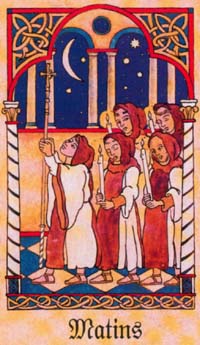 Morning Prayer
Morning Prayer
The Office of Daily Morning Prayer has very ancient origins. Its antecedents were the Jewish synagogue services containing psalms and Scripture readings. The early Church had services of Scripture readings and prayers as well as an early form of Holy Communion. Our present rites of Morning and Evening Prayer derive from Archbishop Thomas Cranmer’s simplification of the eight daily offices of the medieval Roman Catholic Church (Prime, Matins, Lauds, Terce, Sext, None, Vespers, Compline). The genius of Archbishop Cranmer in doing this can be seen from the availability of lectionary and offices in a single book, the Book of Common Prayer, the appearance of such a book in English, and the reduction to two of the offices for clergy, religious orders and lay people. Characteristic of the Reformation’s emphasis on penitence but following from penitential sections in the offices of Prime and Compline in the late Middle Ages, was the addition of an Exhortation to Confession, General Confession and Absolution after the Opening Sentences of the Office in 1552.
Morning Prayer is a service arising from the daily worship of the Catholic Church through the ages. It is rooted in the Psalter (“the hymnal of the Old Testament”), in the reading of Scriptures, and the offering of praise, thanksgiving, intercession and petition, all of which follow the confession of sin and absolution at the start of the service. The service presents to us patterns of the various kinds of prayer which should form part of the daily prayer life of the Christian. What Christian should forget to confess his sins to God daily, or give praise and thanks to God daily, and pray in the name of the Lord Jesus Christ for others as well as for himself? Morning Prayer leads us into reading Bible passages or hearing them read aloud. For this reason, among others, Archbishop Cranmer, and the Church of England subsequently, insisted that clergy should say Morning and Evening Prayer daily, so that they might be well-versed in the very Scriptures they were to preach and teach to others.
The Daily Offices of Morning and Evening Prayer also draw every worshiper into the prayer life of the Church. They remind us of how to pray for others and for ourselves, and they can enrich our own continual praise, thanksgiving, petition and intercession. The written prayers of the Prayer Book leap to life as they are spoken, even as we voice them in our thoughts, and they inspire our own individual prayers and link us to the prayers of the Church.
St. Luke’s is one of the few Anglican churches in the Bay area that continue to offer Morning Prayer with sung canticles and hymns on a Sunday morning. Our service of Morning Prayer is held at 10:00 a.m. on the second and fourth Sundays of the month, and all are welcome to attend!